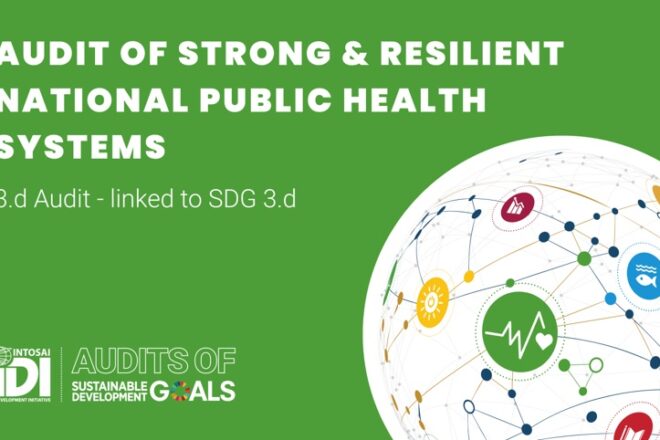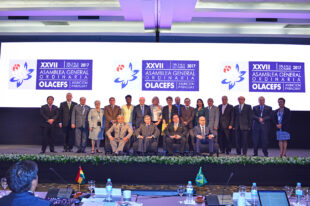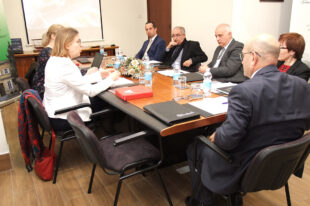SAIs Contribute to Building Strong and Resilient National Public Health Systems

by IDI’s Sustainable Development Goals Team
As the world deals with a global health crisis, the immense importance of strong and resilient public health systems to achieving United Nations Sustainable Development Goal 3 (SDG 3)—ensure healthy lives and promote well-being for all at all ages—has never been more evident. Supreme Audit Institutions (SAIs) have a key role to play in addressing the deepening inequalities during such pandemics and in ensuring vulnerable segments of the population are not left behind.
To that end, the INTOSAI Development Initiative (IDI), in collaboration with the regional secretariats and Knowledge Sharing and Knowledge Services Committee (KSC), is supporting a cooperative performance audit linked to SDG target 3.d (strengthen the capacity of all countries, in particular developing countries, for early warning, risk reduction and management of national and global health risks). The World Health Organization’s (WHO) Health Services Resilience team is providing technical support for this effort. This cooperative audit may have impact at both the country and regional levels, as the audit reports from several SAIs in a region will provide a comprehensive picture of the status of SDG 3.d implementation.
To build SAIs’ capacity to conduct these audits, IDI has developed an Integrated Education & Audit Support Platform with four elements: education contents (asynchronous units and synchronous classes), social learning (discussion forums, parking lots, cafes, webinars, and audit question bank), other resources (library, audio and video links, and links to other courses), and audit support (feedback and support for each stage of the audit). In addition to the IDI team, nineteen mentors are engaged to deliver this support.
Thirty-nine SAIs in five regions are participating in the 3.d audits, and most teams are currently at the end of the planning phase. Reports are expected to be completed around the end of the first quarter of 2022.
What is Public Health System Resilience?
Resilient public health systems mitigate, prepare for, respond to, and recover from disruptive events while continuing to provide essential health services, and they use their experiences to guide improvements. Achieving resilience requires a multifaceted, whole-of-society approach to public health emergencies at the policy, operational, and service delivery levels, including strengthening essential public health functions. According to WHO, examples of such functions include surveillance, health protection and promotion, and public health preparedness.
Resilient public health systems align “health emergency planning with broader health sector strategy and vice versa, including appropriate budgets and monitoring and evaluation (M&E) frameworks for planned as well as unexpected interventions” (Mustafa et al., 2021).
How Can SAIs Effectively Conduct SDG 3.d Audits?
While public health system resilience has many dimensions, the 3.d audits focus on those included under this specific target. In their 3.d audits, SAIs can examine how governments are enhancing their capacity to do the following (depending on their national context and risk):
- Forecast, prevent, and prepare for public health emergencies
- Adapt, absorb, and respond to public health emergencies
- Maintain essential health services during emergencies
SAIs should focus on policy coherence and integration across the government, as well as on the extent to which the government has involved diverse stakeholders in its efforts. One of the principles of the UN 2030 Agenda is that all processes for implementing the SDGs be participatory and inclusive. Stakeholders include all levels and sectors of government, civil society and the private sector, members of parliament, and national human rights institutions.
Stakeholder engagement is closely linked to another important principle that undergirds 3.d audits: “leave no one behind.” Poverty and inequality can prevent vulnerable groups from participating in and benefiting from progress on the SDGs. To evaluate governments’ efforts to leave no one behind in the implementation of SDG 3.d, SAIs can ask questions such as:
- How is the government identifying vulnerable groups?
- Why are these groups being left behind?
- What disaggregated sources of data are available about these groups, and what are the data gaps?
- What is the government doing to determine the needs of, and to support, these groups?
How Can SAIs Ensure their Audits Build Public Health System Resilience?
As outlined in IDI’s SDGs Audit Model (ISAM), SAIs should focus on impact at all stages of their SDG audits, including when designing, conducting, and reporting on the audits. The guide includes practical “Spotlight Questions on Audit Impact” for SAIs to consider throughout the process.
After issuing their audit report, SAIs can take further actions to enhance audit impact:
- Examine the corrective actions taken by responsible parties based on the results of the audit. Depending on mandate, audit practices, and capacity, SAIs could meet with the leadership of audited entities, request progress reports, or conduct follow-up audits.
- Communicate key messages from the audit at the national, regional, and international levels, such as through press releases, participation in events, and social media.
- Create coalitions of stakeholders to foster a strong sense of ownership in the SAI’s work and recommendations.
In recent meetings of SAI leaders and stakeholders in the Arab Organization of SAIs (ARABOSAI), Asian Organization of SAIs (ASOSAI), Pacific Association of SAIs (PASAI), and Caribbean Organization of SAIs (CAROSAI), external stakeholders affirmed the contribution of these audits to making public health systems more resilient and better able to respond to future crises.
By undertaking these audits in the midst of the current global health crisis, SAIs are demonstrating to citizens, decision-makers, and external stakeholders that they can respond effectively to changing environments and emerging risks. More information on auditing SDG 3.d can be found here.
“Working as a mentor for this cooperative audit has not only helped me grow professionally and personally but helped me understand deeply why the works of the SAIs matter and how we can contribute to the lives of the citizens. This engagement has taught me the importance of covering the aspects of whole of the government approach and inclusiveness in performance auditing to have greater impact.”
Sonam Wnagmo, SAI Bhutan





